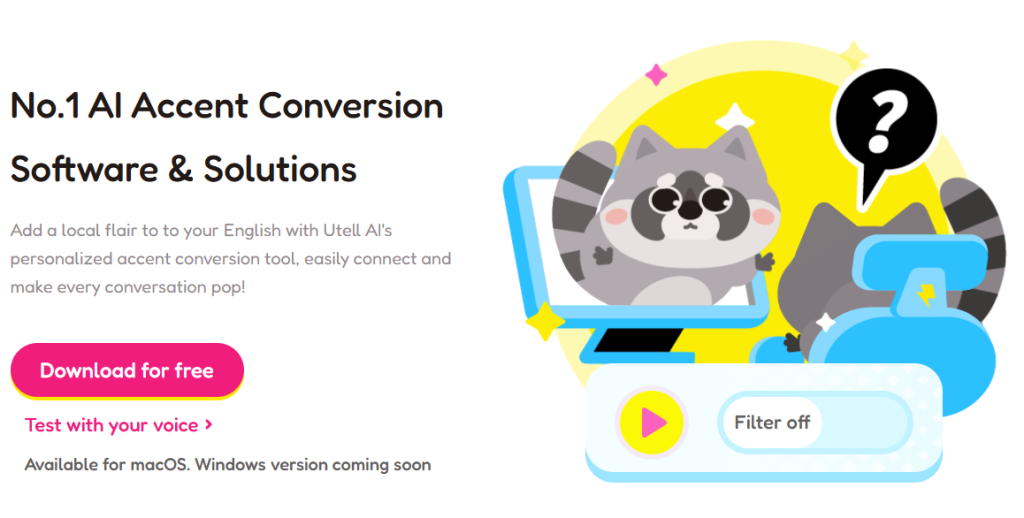Have you ever felt worried that your accent or language could stop you at work? You are not the only one. Many people deal with accent barriers every day. A study from Learning News says 20% of workers feel judged for their accent. Some people even change how they talk. In the U.S., 13% of workers have changed their accent at work. Also, 10% think their accent hurts their career. These barriers can seem hard, but you can get past them with good strategies. If you use helpful communication skills and clear language, you will feel more sure of yourself. Every workplace gets better with cultural understanding and open talk. You will find tips and tools, like those from Utell AI, that help you get past accent and language barriers.
- Accent Barriers in the Workplace
- Overcome Language Barriers
- Communication Skills Training
- Supportive Workplace Culture
- Tools for Language Barriers at Work
- FAQs
Accent Barriers in the Workplace
Impact on Communication
Accent barriers can make it hard to talk with your team. You might not always understand what a coworker says. You may also worry that others do not understand you. These language barriers can cause people to repeat questions. Sometimes, you might miss important details. You could even feel left out of group talks. People might ask you to say things again. You may need to ask others to speak slower. This can make everyone feel upset.
A Harvard Business Review study found that accent barriers can lower team performance by 30%. When people have trouble talking, teams might miss key facts or make mistakes. Sometimes, these problems can even cause accidents or make people feel less happy at work. Tools like AI-powered transcription can help fix mistakes and let more people join in. Remember, everyone has an accent. Having one does not mean you are not good at your job.
Tip: If you cannot understand someone, use clues from what they say or ask for a written note. This keeps things clear and stops confusion.
Career and Teamwork
Accent barriers do not just make talking harder. They can also change your career and teamwork. Some people feel judged or ignored because of their accent. Studies show that women with non-native accents face more problems at work. People may think they are not as good, even if they have the right skills. This is called accent bias. It can stop talented people from moving up.
But there is hope. Non-native speakers often try harder to make their words clear. This careful way of talking can help teams work better. For example, a professor who learned English later was easier to understand. He explained things in a simple way. When you and your team show kindness and respect for different cultures, you make your workplace stronger and more welcoming.
- Talk openly about language barriers at work.
- Help each other by sharing ideas and learning about new cultures.
- Remember, being kind and patient helps everyone get past accent barriers.
Overcome Language Barriers
Clarity in Speech
You can get past language barriers by working on how you talk. Clear speech helps everyone get your message, even if you have an accent. Many people worry about their accent, but you can use good ways to talk and feel sure of yourself.
Here are some helpful ways to speak clearly:
- Visualize success before you speak. Picture yourself talking with confidence. This can help you feel calm and make your words stronger.
- Take deep breaths. Breathing slowly keeps you calm and helps you talk clearly.
- Record yourself. Listen to how you sound. You might hear filler words or unclear sounds. This helps you know what to fix.
- Build inner confidence. Confidence is more important than a perfect accent or grammar. If you believe in yourself, people will listen.
- Slow down your speech. Talking slowly helps others understand your accent. It also helps you feel less nervous.
- Use simple words. Pick easy words instead of hard ones. This makes your message clear for everyone.
- Swap hard words for easy ones. If a word is hard to say, use a simpler word or phrase.
- Practice English intonation. Listen to native speakers on podcasts or TV. Try to copy how they say things. This helps your speech sound more natural.
Tip: Talking slowly and simply is a strong way to communicate. It helps you not stutter and keeps your message clear.
Projecting your voice is also important. Speak loud enough so everyone hears you, but do not yell. Good posture helps your voice carry. When you project your voice, your team can hear you better, even with accent barriers. Always check if people understand. Ask, “Did that make sense?” or “Can I explain anything again?” This shows you care about clear talk and helps stop confusion.
Listening well is just as important as talking. Pay attention to others, watch their body language, and ask follow-up questions. This builds trust and helps you get past language barriers together.
Avoiding Jargon
Jargon and idioms can make language barriers worse. Not everyone knows what “hit the ground running” or “think outside the box” means. Using simple words helps everyone understand, no matter where they are from.
Here are some good ways to avoid jargon and make your message clear:
| Best Practice | Explanation |
|---|---|
| Use Clear and Simplified Language | Do not use jargon, idioms, or slang. Use simple words so everyone gets it. |
| Employ Visual Aids | Use charts, graphs, or pictures to help explain your ideas. Visuals can help break language barriers. |
| Practice Active Listening and Feedback Loops | Ask questions and check if people understand. Make sure your message is clear. |
| Adopt an Open-Door Policy | Make it easy for others to ask questions or share worries. This helps fix problems fast. |
- Use plain words. Say “start working now” instead of “hit the ground running.”
- Ask open-ended questions. For example, “What do you think about this idea?” This helps others share and lets you check if they understand.
- Encourage feedback. Let your team know it is okay to ask if something is not clear.
Note: When you use simple words and skip idioms, you help everyone talk better. This makes your team stronger and more welcoming.
You can get past language barriers by using these good ways. Practice these skills every day. Focus on clear speech, listening well, and using simple words. These ways to communicate will help you connect with your team and feel sure of yourself, no matter your accent.
Communication Skills Training
If you want to get past accent barriers, you need good strategies. Communication skills training gives you tools to talk clearly and feel more sure of yourself. Many people find that mixing accent reduction, language classes, and daily practice helps the most. Let’s look at some easy strategies you can use now.
Pronunciation Practice
You can change how you sound by practicing pronunciation every day. Accent reduction does not mean losing your accent. It means making your words clear so everyone understands. Here are some good ways to practice pronunciation:
- Work on hard sounds like “th” and ending consonants. These sounds can be tricky.
- Practice for 10-15 minutes each day. Short, daily practice works better than long, rare practice.
- Read your work emails out loud. This helps you use real words and practice saying them.
- Speak slowly. This makes your words easier to understand and helps with your accent.
- Use the right intonation. For yes/no questions, your voice should go up. For statements, your voice should go down.
- Try “touch and release” for consonants. This helps you say each sound clearly.
- Learn to fix your own mistakes. Notice how your tongue, teeth, lips, and jaw move.
- Say ending consonants carefully. Missing these can change what your words mean.
- Practice hard words and numbers, like “tens” and “teens.”
- Use the right vowel sounds in words that are easy to mix up, like “can’t.”
Tip: Record yourself and listen to it. You will hear what you need to fix. Apps like Utell AI or ELSA Speak can give you feedback and help you see your progress.
You can also make your own accent reduction plan. Set small goals, like learning one sound each week. Use tongue twisters and copy native speakers from podcasts or videos. Try shadowing, where you repeat what someone says right after them. These ways help you remember new sounds and make them feel normal.
Many companies use accent reduction programs. Some people see changes after just two sessions. With ten sessions and daily practice, most people see over 70% improvement. These programs help you change how your mouth moves, so you can say sounds that were hard before. You will feel more sure and clear when you talk.
Language Classes
Language classes are another good way to get past accent barriers. The best classes teach real workplace skills. You can find business English classes that show you how to write emails, talk on the phone, and give presentations. Some classes are made for your job, like healthcare or customer service. These classes help you learn the words you need every day.
Here’s a table showing the types of language classes that help workers the most:
| Type of Class | What You Learn | Why It Helps |
|---|---|---|
| Business English | Email writing, phone etiquette, presentations | Improves daily work communication |
| Industry-Specific Language | Words and phrases for your job (e.g., healthcare) | Makes you more effective at work |
| Communication Workshops | Listening, body language, conversation styles | Builds teamwork and trust |
| Cultural and Etiquette | How to work with people from other cultures | Avoids misunderstandings |
| Writing and Grammar Refresh | Clear, correct writing for emails and reports | Reduces mistakes and confusion |
You can join classes online or in person. Many companies offer language classes at work. Some use apps or AI tools, so you can practice anytime. For example, ELSA Speak and Utell AI help you get better at pronunciation and feel more sure. After three months, many people see big changes in how they talk and feel at work.
Note: The best ways include regular practice, feedback from teachers or apps, and setting clear goals. You should check your progress often and celebrate small wins.
Corporate language training works best if you keep practicing. You might learn fast at first, then stop for a while. That is normal. Keep going, and try new ways to stay interested. Try new exercises, ask for feedback, and use technology to make learning fun. Over time, you will see real changes in your language skills at work.
Supportive Workplace Culture
Open Dialogue
Talking about culture and accents helps make work better. When people share stories, everyone learns new things. You can help by making rules for respect and kindness. If someone has trouble with their accent, listen and support them. Team meetings are best when everyone feels safe to talk.
Here are some ways to help people talk openly:
- Make rules for good behavior at work.
- Teach how to handle disagreements kindly.
- Respect how people work in different ways.
- Celebrate holidays from many cultures so all feel welcome.
- Give safe places for honest talks about language and accents.
- Use team games to help people share about their cultures.
Tip: Ask about someone’s culture or first language. This shows you care. It can help people worry less about their accent and feel stronger as a team.
Cultural Education
Learning about culture helps people respect each other more. You can go to classes or workshops about culture and accents. Many jobs now have programs to teach about bias and culture. These programs help you see your own habits and learn to help others.
Here is a table with top ways to learn about culture and what they do:
| Strategy | Description | Impact on Culture |
|---|---|---|
| DEI Officers | Leaders who help with culture and diversity. | Builds trust and support |
| Awareness Training | Classes to spot and stop bias. | Promotes fairness |
| Inclusive Onboarding | Welcoming new workers from all backgrounds. | Boosts belonging |
| Courageous Conversations | Talks about culture and accent problems. | Reduces stigma |
| Measurable Goals | Check progress in culture and language. | Shows real improvement |
You can join groups at work or go to events to learn about other cultures. These groups help you meet people and learn new things. When you share your own culture, others see why diversity matters. Leaders should show respect, listen to ideas, and keep making culture better.
Note: Workplaces that teach about culture have better teamwork and happier workers. When you learn about differences, everyone feels like they belong.
Tools for Language Barriers at Work
Use Utell AI

Utell AI is a real-time accent-reduction tool that instantly reshapes your speech so it sounds like a neutral American accent while you’re talking. Instead of hours of coaching or post-production editing, Utell AI performs the conversion live, letting you communicate clearly on calls, video conferences, webinars, or recorded tutorials. It plugs into the tools you already use—Microsoft Teams, Zoom, Google Meet.
What makes it different
• Live phoneme reshaping – As you speak, Utell AI detects non-native phonetic patterns (vowel length, consonant aspiration, intonation) and replaces them with American-English equivalents in under 100 ms.
• Noise-robust processing – Background-noise suppression and echo cancellation ensure the accent filter works even in open offices or cafés.
• Adjustable strength – Dial the “Americanization” level from light polishing to full native-like delivery so your own vocal identity isn’t lost.
• On-device privacy – Audio is processed locally or in a zero-retention encrypted stream; no clips are stored or used to retrain models unless you opt in.
• Seamless integrations – One-click plug-ins for Zoom, Teams, Google Meet, Webex, OBS, and most USB microphones.
Benefits for the workplace
• Clarity: Listeners spend less effort decoding pronunciation, so meetings move faster and misunderstandings drop.
• Confidence: Speakers feel surer of themselves, leading to more participation and stronger presentations.
• Professional image: Client-facing roles (sales, support, consulting) project a polished, standardized brand voice.
• Reduced training cost: HR can offer Utell AI as an immediate aid instead of months of accent coaching classes.
Visual Aids
Visual aids can help make your ideas easier to understand. Pictures and diagrams help people get your point, even if words are hard. Your brain understands pictures faster than words, so you learn quickly. Try using these tools at work: 1. Show steps with diagrams or flowcharts. 2. Use infographics or pictograms for safety rules. 3. Share videos to show how to do new tasks. 4. Use colors to mark safe or unsafe places. 5. Add short labels to pictures.
Keep your visuals simple and easy to see. Do not use too many details or tricky symbols. Always ask your team if the visuals are clear. You can also write short notes to help everyone remember the main ideas. Give these notes after meetings to help your team stay focused and avoid mistakes. Using both pictures and notes helps people who learn in different ways.
Tip: Ask your team what they think about your visuals. This helps you know what works and makes your message better.
Translation Services
Translation services help teams who speak different languages work together. You can use interpreters, phone or video translation, and AI captions. These tools help everyone understand important things right away. For example, you can get help during meetings or when sharing safety news.
Professional translators are best for important papers like handbooks or rules. They make sure nothing important is missed, even with special words or laws. This keeps your team safe and up to date. Machine translation is quick, but it can miss things or get special words wrong. Always check important messages to be sure.
If someone treats you unfairly because of your accent, write down what happened. Note the date, time, and what was said. Tell your manager or HR about it. Good notes help your company fix problems and treat everyone fairly.
Note: Using translation tools and keeping good records helps build trust and teamwork. It makes sure everyone feels welcome and safe at work.
You can get past accent barriers by speaking clearly. Use pictures and learn about other cultures. Try taking language classes and practice with apps. Ask your team to give you feedback. Many people feel more confident after accent training. This helps them do better at work. Your accent is important and shows who you are. Be proud of it and keep learning new things. Use tools like Utell AI to help you. When you share your voice, you make your workplace better for everyone.
FAQs
What should I do if someone doesn’t understand my accent?
You can repeat your words slowly or use simple phrases. Try writing down key points or using a picture. Ask if they want you to explain in a different way. This helps everyone feel comfortable.
How can I feel more confident about my accent at work?
Practice speaking every day. Record yourself and listen. Remember, everyone has an accent. Focus on clear speech, not perfection. Celebrate your progress. Your voice matters at work.
Can accent barriers affect my job growth?
Yes, sometimes accent barriers can make it harder to share ideas or get noticed. You can overcome this by practicing communication skills and asking for feedback. Many companies now support language training to help you succeed.
What tools help with accent barriers?
You can use apps like Utell AI for practice. Visual aids, translation services, and written notes also help. Ask your team for feedback. These tools make communication easier for everyone.
Should I try to lose my accent completely?
No, you do not need to lose your accent. Focus on being clear and confident. Your accent is part of who you are. Many workplaces value different voices and backgrounds.



